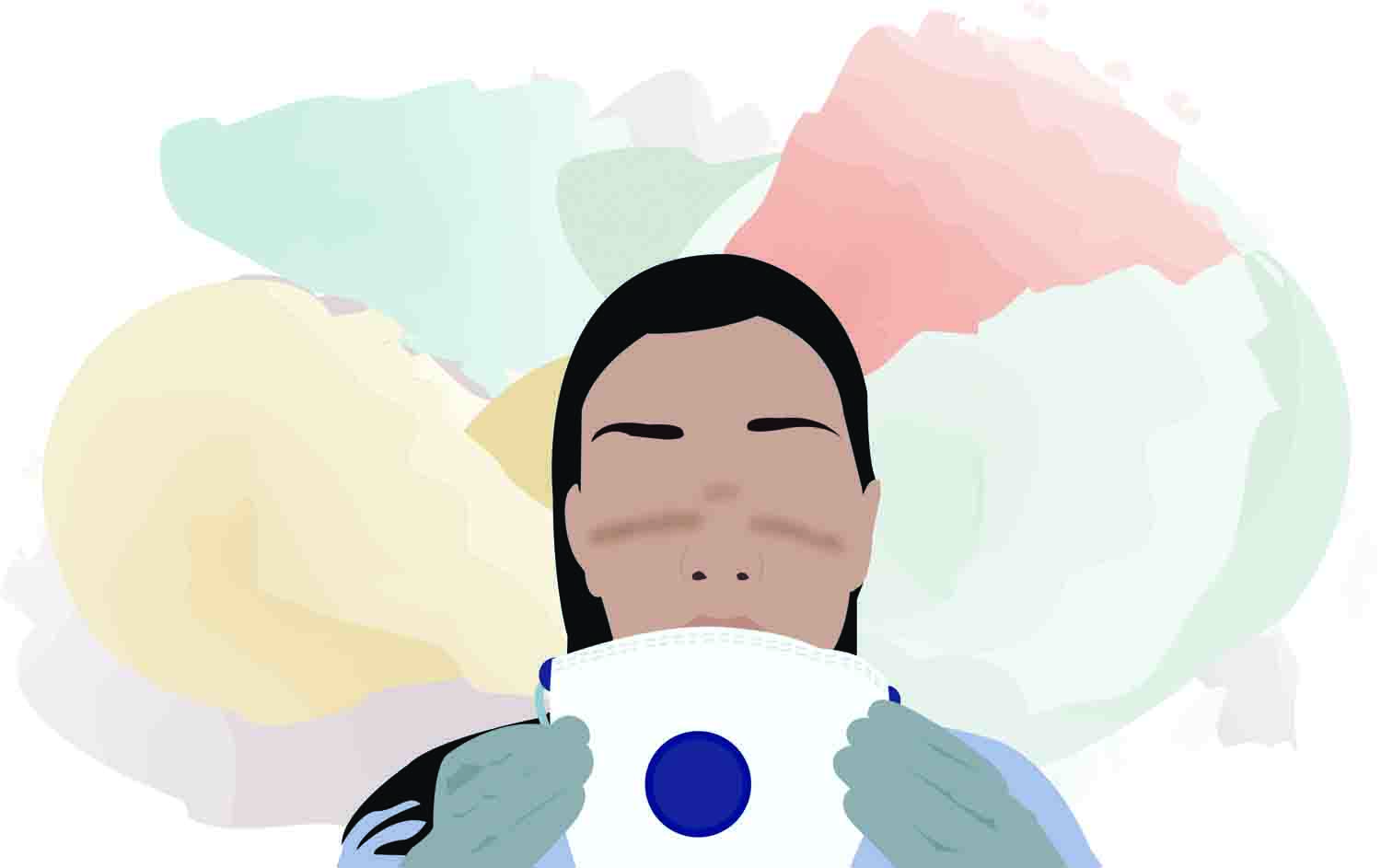
TO honor the over 4 million registered nurses and their tireless fight against COVID-19 in the United States, the American Nurses Association (ANA) extended for the entire month of May the celebration of National Nurses Week, which takes place from May 6 to 12.
“Since the pandemic, honoring our nation’s nurses is more profoundly significant, which makes this month of recognition in May even more important,” said the ANA on its website.
With this year’s theme of “Nurses Make A Difference,” the ANA will promote weekly themes and activities centered on self-care, recognition, professional development and community engagement.
The first attempt to recognize U.S. nurses’ invaluable contributions was initiated in 1953, when Dorothy Sutherland of the U.S. Department of Health, Education, and Welfare sent a proposal to then-President Dwight Eisenhower to proclaim a “Nurse Day.”
However, a proclamation was never made. It was only in 1974 when the International Council of Nurses (ICN) declared May 12, the anniversary of Florence Nightingale’s birth, as the “International Nurse Day.”
Meanwhile, May 6 was proclaimed as “National Recognition Day for Nurses” in 1982, with then-President Ronald Reagan signing an executive order to make it official. This happened four years after New Jersey Governor Brendon Byrne declared the date as “Nurses Day.”
In 1990, the ANA decided to expand the recognition of nurses to a week-long celebration, declaring May 6 to 12 as National Nurses Week, which is observed by each of ANA’s state and district nurses associations to this day.
Nursing in the time of a pandemic
The history of Filipinos migrating to the United States to be trained as nurses stems back to the 1900s. Some stayed in the country, while others returned to the Philippines to put their expertise to practice and set up nursing schools and programs.
Today, nurses of Filipino descent make up 4% of the nursing population in the U.S.
COVID-19 has put the U.S. health care system under immense pressure, pushing nurses to work around the clock while grappling with shortages of staff, hospital beds, and medical supplies, including personal protective equipment.
During the pandemic, however, Filipino nurses have comprised 26.4% of registered nurse fatalities (or 83 individuals), according to the National Nurses United’s “Sins of Omissions” report, highlighting at least 329 RNs of different backgrounds who have died up until Feb. 2021.

Diana Brieva from Southern California said she rejoined the frontlines as a nurse due to the “extreme shortage in nursing staff to patient ratio during the pandemic.”
The lack of staff, according to her, caused their specialty department, which normally provided rehabilitation to patients recovering from strokes, multiple traumas and spinal cord injuries to temporarily cease admissions.
“Our unit was converted into a medical overflow in relation to the spike of COVID patients needing more hospital beds. Single private rooms were transformed into double beds,” Brieva told the Asian Journal.
When she was given the choice to either work for the float pool, which was basically helping with errands around the hospital, or work for nursing, Brieva chose the latter.
“10+ years away and I truthfully feel like it was a calling to come back to work alongside my fellow colleagues and nurses. I could have probably taken the easier route in the float pool but I had the knowledge and the experience as a nurse,” she said.

“For some reason, I felt like I needed to be there on the frontlines. They needed help and I was all hands on board, no matter how scared I was,” she added.
Being a nurse is not easy, and the rapidly moving global pandemic is stretching nurses beyond their capacities. To relieve stress on the job, Joseph Catindig, a registered nurse at Kaiser Vallejo, said he uses a lot of humor at work, which “spills over” to both his co-workers and their patients.
“We have venting sessions and we just listen to each others’ frustrations. There are positive things about this job that we experience, especially when we see our COVID patients get reunited with their families and go back to the comfort of their homes. We, the nurses, claim victory each time we discharge and transport a patient to a family member waiting at the designated pick-up spot in our hospital. That’s a good feeling to have,” Catindig told the Asian Journal.
Celebrating nurses
For all their efforts in safeguarding the lives of everyone, nurses truly deserve genuine support and appreciation. As a community, how can we honor them during this month-long celebration?
“Celebrate us by continuing to wear masks, social distancing, and getting vaccinated if they have not done so. These are simple but important steps to prevent the further spread of this nasty virus and to reach herd immunity,” said Catindig.
Meanwhile, Brieva stressed that Nurses Month is for honoring all nurses.
“Little do we forget that there are not only Registered Nurses, but there are also Licensed Vocational Nurses and Certified Nurse Assistants that work just as hard. Salute all nurses because they all truly show up every shift into the unexpected with compassion, strength, knowledge, dedication, and humility,” she said.
International Nurses Day
Just like the U.S., many countries are experiencing an overwhelmed health care system amid the pandemic. It is only fitting to recognize and uplift nurses across the world for their hard work and sacrifices on International Nurses Day, May 12.
Vernz Vargas Ching, a Filipina nurse working in Saskatoon, Saskatchewan in Canada, echoed Catindig’s sentiment, saying complying with health protocols is one way to celebrate them.
“During these times, one way of recognizing and celebrating nurses is by showing that people are consciously practicing the proper guidelines set to minimize the spread of disease,” she said.
“Nurses and other healthcare professionals are working tirelessly to care for those who are infected, and knowing that people are also putting their best efforts to reduce the strain to the healthcare field will be one way of honoring us,” she added.
Meanwhile, London-based Filipina nurse Claire Mangilit said a simple “thank you” would be enough.
“Nurses are the lynchpin of health care services around the globe. They selflessly go beyond their means to ensure that they’re providing the highest quality of care to their patients. This has been greatly reflected in the past year wherein nurses around the world have unitedly battled against the virus,” she said.
“We have managed patient caseloads that are twice or three times more than what we’re used to. We have cared for sicker patients, witnessed more deaths, and consoled more families. A typical nurse’s day is usually quite challenging, but the past year has been the most difficult as we have been continuously placed on the frontline against an invisible villain, wave after wave,” continued Mangilit.
“With the incoming International Nurses’ Day, I believe nurses should be celebrated and recognized through simple acts of saying ‘thank you’ to acknowledge our resilience, bravery, and courage throughout the pandemic,” she said.
Mangilit noted that nurses are currently at the “highest risk of experiencing burnout and compassion fatigue,” adding that showing gratitude is “more than enough to boost our morale and to remind us that all our hard work is valued by our patients.”
In the Philippines, Filipina nurse Erica Salilin said fancy celebrations aren’t necessary as long as nurses are getting support from the people.
“Today, nurses continue to serve despite the threats, disrespect, and the lack of support from so many people. For me, there’s no need for a fancy celebration, what we really want from people is to support us during the fight against this pandemic,” she said.
She also stressed that the Philippine government should show appreciation by protecting them.
Last year, several reports of health care workers being targets of COVID-related acts of violence, harassment, and discrimination in the country became news. Among these incidents include a nurse in Mindanao getting doused with bleach in the face, and other medical professionals being refused access to public transportation and evicted from their homes.
“[The] government should protect the nurses at all cost. It is not expensive to do so, and we deserve nothing less,” said Salilin. “Plus, they should increase the salary of nurses who are battling [COVID-19] everyday. COVID took away many good nurses, but some of us are still underpaid.”
Filipino nurse JD Santelices shared the sentiment.
“Sana makita [ng gobyerno] ang importansya ng mga nurses (I hope the government realizes the importance of nurses). We want the government to make us feel ‘special’ para hindi na kami mangibang bansa (so we wouldn’t work overseas),” he said.
However, Santelices pointed out that nurses shouldn’t only be celebrated during International Nurses’ Day.
“As far as I am concerned, people must not wait for the month of May to show their appreciation towards the nurses, but rather, they can make it a habit,” he said.
“Technically, nurses ang kasama ng mga pasyente (nurses are with patients) 24/7. In short, it is better recommended for the people to celebrate the lives of the nurses every single day, lalo na ngayong pandemic (especially now that there’s a pandemic), we are risking our lives to make theirs’ better,” he added.
Santelices also said that showing appreciation should be extended to other medical professionals to boost their morale.
“Maaari din nilang gawin ‘to sa lahat ng healthcare workers, para ma-uplift ang aming moral at hindi naman maisip at pagsisihan ang pag-pili sa propesyon na ‘to. Trabaho namin ito, oo, pero buhay namin ang nakataya sa pagtulong sa kapwa ([The people] can also do it to all healthcare workers, so our morales can be uplifted and we don’t think and regret choosing this profession. This is our job, yes, but our lives are at stake while helping others),” he explained.
On the other hand, Filipino nurse Michael Cardiel said international organizations can celebrate nurses by holding webinars for them.
“In a world where COVID-19 is still a global problem, nurses can have a joyous celebration virtually to commemorate the annual International Nurses’ Day. Nurses must support other nurses to boost others’ morale, to uplift everybody’s spirit, and to give inspiration,” he said.
He added that international nurses organizations must “provide free webinars where nurses can attend the lectures and training, interact virtually, and hear other nurses’ stories.”
A voice to lead: A vision for future health care
For 2021, the ICN announced that the theme of International Nurses’ Day will seek to highlight the ways nurses are innovating and explore what nursing may look like in the future.
“In the years to come, I can project that caring for the patients will be more effective and efficient thanks to technology. Nurses can become leaders in the field with extensive education and advancement,” said Ching.
Philippine-based nurse Eufrance Dela Gente had the same sentiment. “In the world where technology is rampant and popular to every citizen, I can foresee that nurses in the future will somehow be eloquent in using such devices or equipment that improve the lives of people,” he said.
“Furthermore, research as a whole will also be the source of embarkment of knowledge, by easy access to medical needs, teachings, or even proper management of care,” he added.
Cardiel, meanwhile, noted that nurses are “resorting” to work-from-home jobs such as in Business Processing Outsourcing industries to avoid contracting the virus.
“Because of this inevitable situation, the roles of nursing expands not just only in the hospital, but also in the comfort of their home where [nurses] can help maintain and develop quality assurance procedures and case management review,” he explained.
For Santelices, he believed that the field of nursing will expand in the future.
“The way I see it, the nursing profession will be significantly in demand not just here in the Philippines, but across the globe. Given the catastrophes brought by the COVID-19 to the healthcare force, international healthcare human resources is severely affected,” he said.
“Mataas din ang bilang ng mga nurses na mag-reretiro sa mga susunod na taon. Kaya sa ganang akin, ang mga nurses ay magiging in demand sa buong mundo (A high number of nurses will also retire in the following years. So for me, nurses are going to be in demand in the whole world),” he added.
This vision is shared by Mangilit, who noted that nursing is “a continuously growing profession.”
“Amidst the pandemic, nurses had been acknowledged with equal importance and autonomy with other members of the healthcare team,” she said.
According to her, nurses’ exceptional critical thinking, resilience, and communication skills would “allow more nursing roles to expand such as in fields of research, leadership, and critical care.”
“I believe the previous year of the pandemic would inspire the younger generation to consider a career in nursing, where science and compassion concurrently provide a rewarding profession and a plethora of opportunities worldwide,” added Mangilit.
And while Salilin was also firm that the nursing profession “will continue to be in high demand,” she said that there might be a shortage of nurses in the Philippines as a consequence.
“Here in the Philippines? I think there will be a shortage when it comes to staffing. Many nurses still pursue to work abroad to earn more,” she noted.






